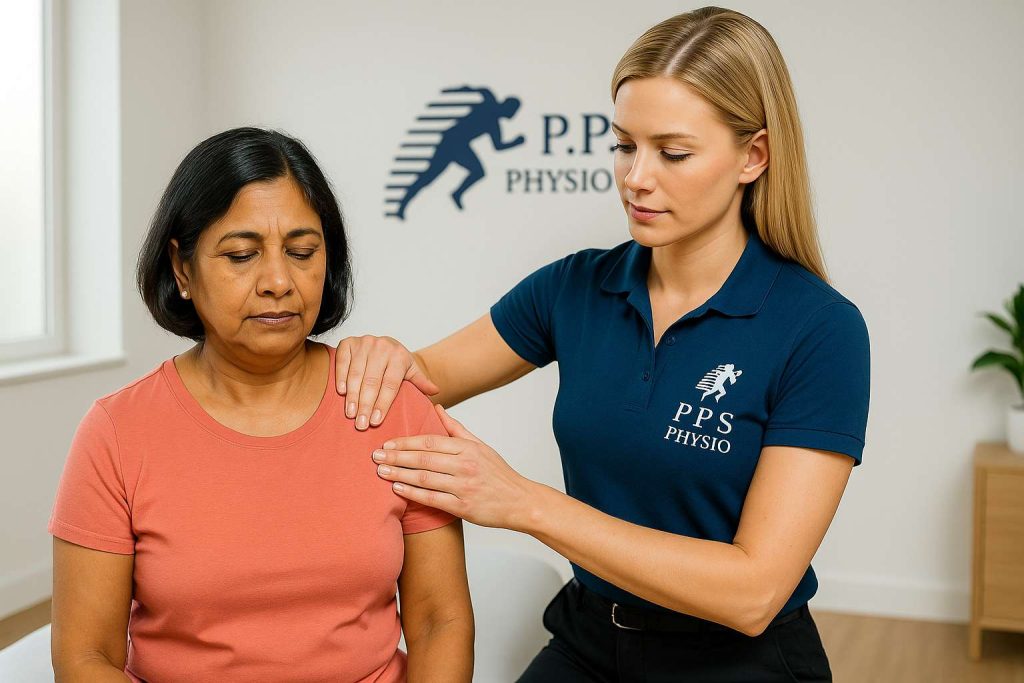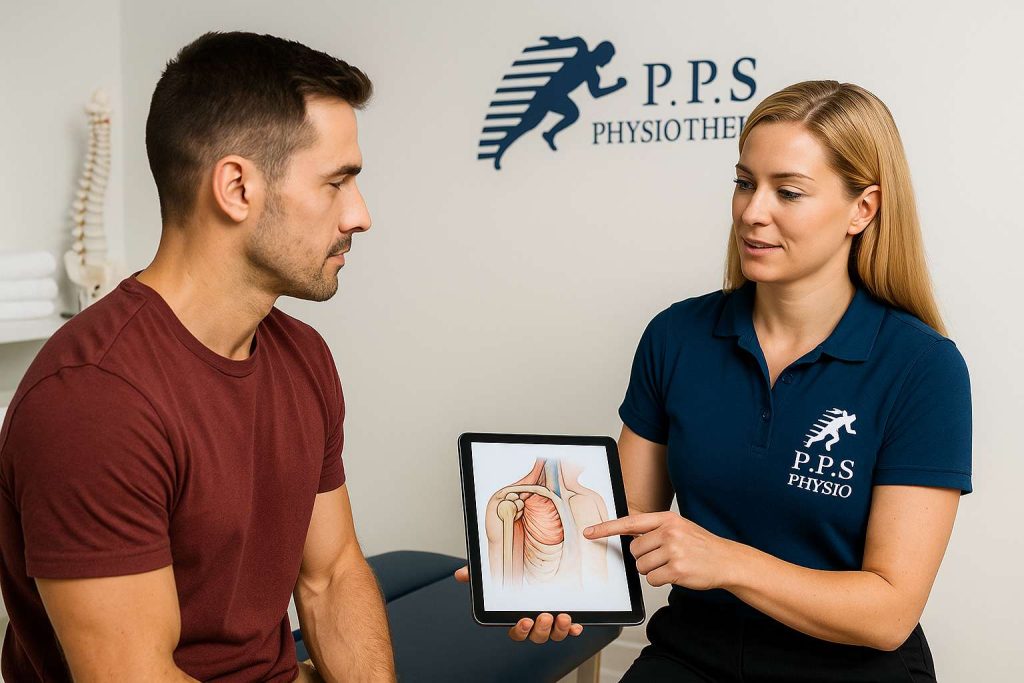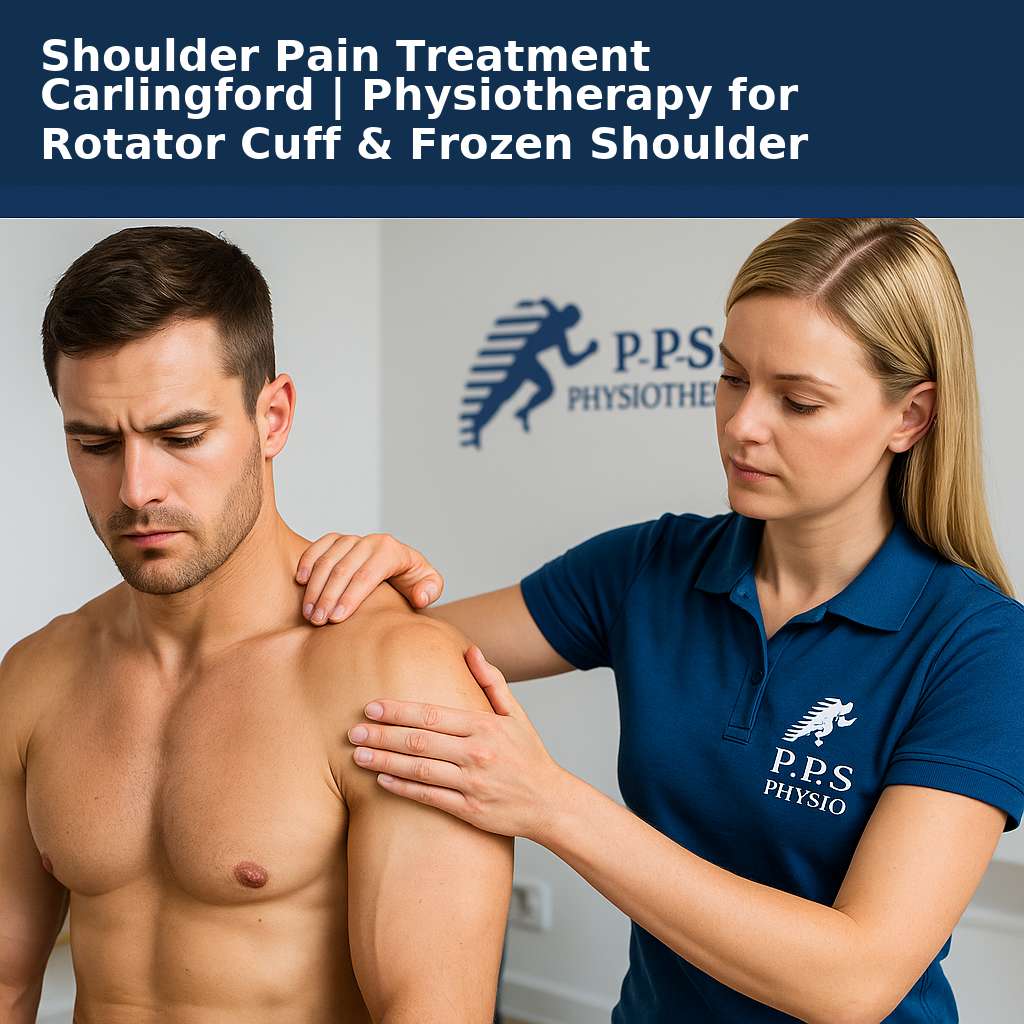Shoulder Pain Treatment Carlingford | Physiotherapy for Rotator Cuff & Frozen Shoulder
Shoulder pain holding you back? Our Carlingford physiotherapists can assess the cause of your pain and provide step-by-step treatment. With the right care, you can return to lifting, reaching, and sleeping without discomfort.

What’s inside this blog
Shoulder pain is common — and treatable with the right plan
Shoulder Pain Carlingford is a common issue we treat at PPS Physiotherapy, and with the right plan it can be managed effectively. However, the shoulder’s wide range of motion also makes it prone to problems. Because the joint is complex, even small changes in muscles, tendons, or posture can trigger pain and stiffness. Fortunately, most shoulder conditions respond well to a structured physiotherapy plan.
At PPS Physiotherapy Carlingford, we combine hands-on therapy, specific exercise programs, and education. In addition, we guide you step by step so you understand your condition and feel confident about recovery.
Common shoulder pain symptoms Carlingford patients notice
- Sharp pain when lifting the arm or reaching overhead
- Night pain when lying on the shoulder
- Clicking, catching, or “pinching” during movement
- Weakness while lifting or rotating the arm
- Stiffness when reaching behind the back
When to book: If pain lasts longer than 7–10 days, disturbs sleep, steadily worsens, or limits work, sport, or daily tasks, it’s time to seek help.
Top shoulder pain causes we treat in Carlingford
Rotator cuff problems
The rotator cuff keeps the shoulder joint steady. Overuse or age-related changes can irritate the tendon and cause weakness. In most cases, a step-by-step strength program and load management are effective.
Subacromial bursitis & impingement
Often called a “pinched shoulder,” this occurs when the bursa (a small cushion) becomes inflamed. As a result, the space for your tendons narrows and sharp pain appears when you lift your arm. First, we calm pain and swelling. Next, we rebuild strength and control to create more space in the joint and reduce the chance of it returning.
Frozen shoulder (adhesive capsulitis)
This condition causes stiffness and aching. Typically, it moves through three stages — freezing, frozen, and thawing. In the early phase, pain control, gentle mobility exercises, and steady home practice matter most. Over time, these steps help restore movement.
AC joint pain & arthritis
Pain is often felt at the top of the shoulder over the AC joint. For example, reaching across the body or pressing overhead can make it worse. As a result, targeted loading, joint support, and simple task changes can make a big difference.
Posture-related shoulder and neck strain
Hours at a desk or on a phone can pull the shoulders forward and overload the neck. Consequently, muscles work harder than they should. To counter this, we retrain scapular control and improve posture so the shoulder is supported instead of stressed.
For extra reading, see HealthDirect’s frozen shoulder guide and Better Health Victoria’s shoulder pain overview.
Our Carlingford shoulder assessment: clear and practical
- History & goals: We find out what movements hurt, what you need for work or sport, and your goals.
- Movement screen: Next, we check range of motion, painful arcs, and scapular control.
- Strength tests: Muscles such as the rotator cuff and deltoid are tested to guide safe loading.
- Special tests: Evidence-based checks confirm the likely diagnosis, so scans are often unnecessary.
- Plan & timeline: Finally, we explain your recovery in plain language and set milestones.
As part of your plan, progress checks may include pain scores, shoulder disability scores, and functional tests. In short, you’ll see progress in black and white.
Shoulder pain treatment plan at PPS Physiotherapy Carlingford
1) Calm pain & restore comfort
- Hands-on care: joint mobilisation, massage, or dry needling
- Load changes: avoid painful overhead tasks and use easier ranges
- Short-term supports: taping, heat, or ice as needed
2) Rebuild strength & control
Once pain is under control, loading can start safely. From there, a step-by-step plan helps your shoulder grow stronger each week. For example:
Phase A — Early activation
- Isometric external rotation 3×30–45s
- Scapular setting drills 2–3×12
- Supported elevation to a comfortable range 2×10–12
Phase B — Controlled loading
- Sidelying dumbbell external rotation 3×12–15
- Band rows and face pulls 3×12
- Scaption with light dumbbells 2–3×10–12
Phase C — Return to tasks
- Landmine or incline press 3×8–12
- Overhead loading when safe 2–3×6–10
- Task-specific drills (lifting, reaching, sport skills)
3) Prevent flare-ups long-term
- Desk and driving posture changes
- A weekly 10–15 minute “keeper” routine for shoulder strength
- Clear pain rules — green, amber, red — to guide safe activity
Carlingford shoulder pain home care & quick tips
At home, a few simple steps can ease pain and keep you moving.
- Ice or heat: Apply for 10–15 minutes, whichever feels better.
- Keep moving: Stay within a safe and tolerable range.
- Avoid long immobility: Short, regular movement helps most.
- Sleep support: Use a towel under the arm for comfort at night.
- Medication: Simple anti-inflammatories may help. Still, check with your GP if unsure.
Why PPS Physiotherapy Carlingford?
- Experienced clinicians: Our team helps workers, parents, and athletes every week.
- Evidence-based care: You get a clear assessment, a personalised plan, and visible progress.
- Convenient location: Near Epping, North Rocks, and Baulkham Hills.
- Simple bookings: Online scheduling and after-hours options available.

Shoulder pain FAQs (Carlingford)
How long does recovery take?
Most shoulder pain improves in 6–12 weeks with a structured plan. Even so, frozen shoulder can take longer; however, steady care makes progress possible.
Will I need a scan?
Usually, no. Scans are recommended only if they change the treatment plan. Your physio will guide you.
Do I need a GP referral?
No referral is required; you can book directly. Even so, we’re happy to keep in touch with your GP or specialist.
How many sessions will I need?
It depends on severity and goals. That said, many people feel meaningful change after 3–6 sessions, combined with home practice.
Can physiotherapy help frozen shoulder?
Yes. In particular, pain control, mobility work, and strengthening help improve comfort and function at each stage.
What does a session cost?
For pricing, call the Carlingford clinic to ask about current prices & rebates.
Shoulder pain Carlingford – serving local suburbs
We regularly see patients from Carlingford, Epping, North Rocks, Baulkham Hills, Pennant Hills, and West Ryde. If shoulder pain limits your work, sport, or family life, we can help. In short, our goal is to get you back to what you enjoy. Above all, we aim to make progress simple and measurable.
Prefer Kellyville? Visit our Kellyville clinic.
Ready to fix your shoulder pain in Carlingford?
Book a full Shoulder Assessment at PPS Physiotherapy Carlingford. You’ll get answers, a clear plan, and real progress.

